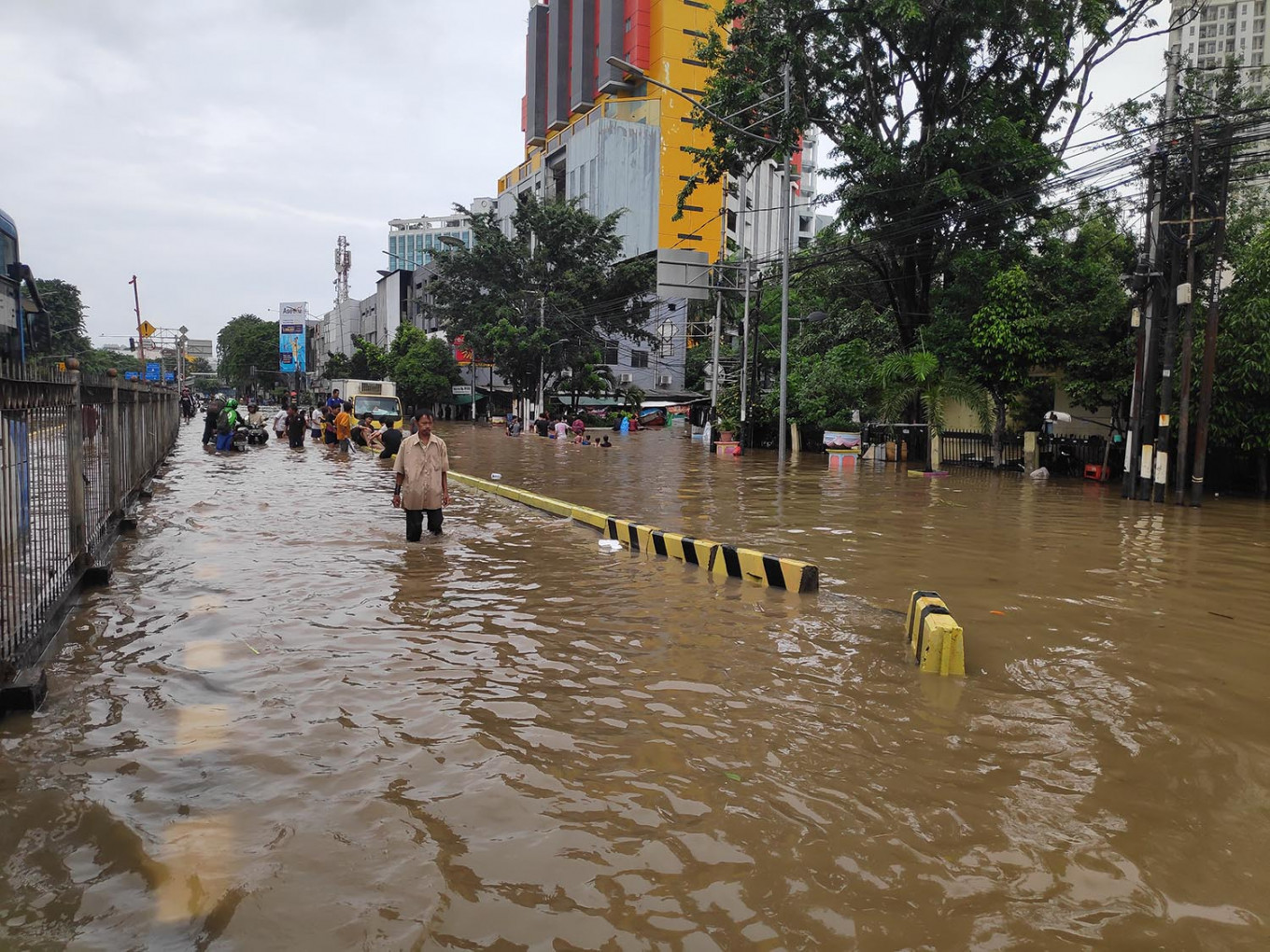Popular Reads
Top Results
Can't find what you're looking for?
View all search resultsPopular Reads
Top Results
Can't find what you're looking for?
View all search resultsJakarta among cities most threatened by rising sea levels, extreme weather: Report
Verisk Maplecroft reported in its 2020 Environmental Risk Outlook issued on Thursday that 11 of the 15 cities most at-risk of sinking are Asian cities that are significant financial and trade centers, including Jakarta, which is especially threatened due to its location in the lowlands.
Change text size
Gift Premium Articles
to Anyone
A
recent study has identified Jakarta as among the world’s major metropolitan areas on the brink of sinking as a result of rising sea levels and extreme weather caused by climate change.
Global strategic and risk consulting company Verisk Maplecroft reported in its 2020 Environmental Risk Outlook issued on Thursday that 11 of the 15 cities most at-risk of sinking are Asian cities that are significant financial and trade centers, including Jakarta, which is especially threatened due to its location in the lowlands.
The company assessed sea level rise exposure to 500 cities with a population of more than 1 million people.
Aside from Jakarta, other cities labeled high risk include Guangzhou, Dongguan and Shanghai in China, Ho Chi Minh City, Vietnam, and Tokyo. Meanwhile, cities outside Asia that face the same risk are Dubai, the United Arab Emirates; Alexandria, Egypt; and New York City, the United States.
Scientists at the Intergovernmental Panel on Climate Change (IPCC) stated in their report last year that the sea level was rising 3.6 millimeters per year. Based on this rate, the sea level could rise between 30 and 110 centimeters by the year 2100.
However, a 60 to 110 cm rise was most likely, the IPCC said as quoted by Verisk Maplecroft, as the world remained on a path of high emissions.
Analysts Will Nichols and Rory Clisby said the risks of rising sea levels were massive and they stressed the importance of urgently addressing the issue and coming up with solutions today.
“Rising seas don’t just mean more frequent flooding, but also greater damage from storms, faster rates of erosion and shrinking water resources if sea water infiltrates aquifers – not to mention the enormous cost of protecting or relocating populations, infrastructure and buildings and the disruption to business operations and supply chains,” they wrote in the report.
Read also: Rising sea levels threaten 23 million in Indonesia's coastal cities by 2050: Study
Heavy rains have caused massive flooding in Jakarta on several occasions this year, with the most recent occurrence claiming at least nine lives and displacing thousands of others.
Read also: Two islands vanish, four more may soon sink, Walhi blames environmental problems
Indonesia, the writers argued, had taken an extraordinary step by moving its capital away from Jakarta, which generated almost a third of the country’s total gross domestic product.
“[However,] Jakarta, the fourth-highest risk city globally, is slowly sinking towards current sea level as the aquifers it sits above are drained.”
A study from Bandung Institute of Technology (ITB) researchers on data from 1925 to 2015 concluded that significant land subsidence had affected the capital city since 1975 due to massive groundwater extraction. The researchers predicted that a large part of Jakarta will be submerged by 2050.
The ITB study also found that Jakarta subsided about 1 to 15 cm per year, making it one of the fastest-sinking cities in the world.
Nichols and Clisby said more advanced nations should have the resources and ability to take financial steps to reduce the climate problem. However, other countries and regions, such as India, North Africa and Southeast Asia, had a limited capacity, the writers argued.
“For lower income nations, reacting to rising sea levels will take time and investment, drawing funding away from other development priorities,” they wrote. “However, failing to prepare for sea level rise will also impact a country’s investment potential and credit risk, making it more difficult to fund much-needed projects.”
The analysts urged authorities to move fast in mitigating the impacts caused by the phenomenon, as “the window to stave off the worst impacts is closing, and yet investments remain well short of what is required”.
“If the rates of sea level rise are accelerating as many researchers have suggested, the extent of the problems we will face this coming century could be well beyond the means of even wealthy nations to cope with.” (syk)










